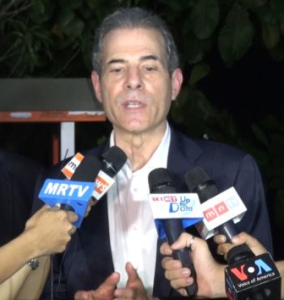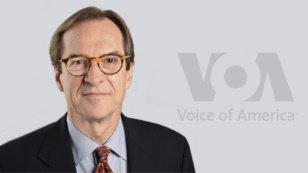BBG Watch Commentary
Will VOA embrace change with social media or ‘old state broadcaster model’ of censored program placements in deals with repressive regimes?

We have read an excellent Voice of America news report in which U.S. Under Secretary of State for Public Diplomacy and Public Affairs Richard Stengel is quoted as saying at an event hosted by the non-partisan American Security Project that “the U.S. is focused now on getting its point of view out in the Russian language, but not through broadcasting, which he called ‘an old model.’ Instead, he said the U.S. is turning to social media.”
READ: Under Secretary Stengel: US in Information ‘Battle’ with IS, Russia
By Alex Villarreal, VOA, September 16, 2014.

Stengel was also reported by VOA as saying that “competing with Russian news, which he described as ‘nothing like what we think of as objective,’ is something the U.S. is now focusing on, including through the Voice of America.
According to the VOA report, VOA Director David Ensor was present for Stengel’s remarks.
But if according to Stengel, broadcasting is “an old model” and the U.S. is turning to social media, that is not what we heard by and large from VOA Director Ensor last week.
According to Ensor, VOA is very much focused on an old “state broadcaster” model, but it a special kind of state broadcasting model — local placement of VOA news reports and local rebroadcasts of VOA programs.
Affiliate placement is not a new model for VOA at all. It’s been around in a major way for at least two decades, but it has taken recently a dangerous turn toward undermining VOA’s journalistic credibility and the VOA Charter. While many program placement arrangements are perfectly legitimate and do not violate the VOA Charter, some of the newer deals with Vietnam and Russia almost certainly do.
Some of the so called “Washington-bureau” reports produced for local placement have to be pre-censored by VOA, in an obvious violation of the VOA Charter and the Broadcasting Board of Governors (BBG) mission statement, if they are to be allowed for local placement by repressive regimes or governments restricting foreign media content for whatever reason, as reflected in a recent proposed deal between VOA and Vietnam.
The irony in this situation is that independent Vietnamese journalists and bloggers jailed by the regime for reporting on human rights violations may soon be able to hear a Voice of America program on the communist Voice of Vietnam beamed over the loud speaker system in their prisons. It will not be, however, a VOA news program from which they can learn about U.S. support for human rights, but a special program with pre-censored information by Voice of America in Washington to ensure that the Vietnamese authorities will not stop it from airing on their state network.
This should improve morale of political prisoners in Vietnam, or will it? Director Ensor is right about one thing, however, the program will increase VOA’s audience share in a country that practices strict media censorship. But what about moral damage to loyal audiences in Vietnam and damage to VOA’s reputation and the VOA Charter?
VOA English correspondents who normally strongly protest against any attempts to undermine VOA’s journalistic independence, especially by the U.S. Congress, have been surprisingly quiet in public about the VOA-Vietnam proposal. How about the Voice of America management investing time, money and effort in social media outreach development instead?
For other types of placement programs, such as the current TV project with Russia, VOA has to agree to relinquish control of the program, which experts on disinformation say, the Russian side is using against the U.S. to score propaganda points.
Director Ensor implied in his speech last week that the State Department and Under Secretary Stengel support this TV project with Russia, which we suspect may be closely supervised by President Putin’s disinformation and propaganda advisors in the Kremlin. It is hard to imagine that a country at war like like Russia with “powerful propaganda machine,” as described by Stengel, would allow this latest TV project with VOA to proceed without making sure that it promotes Russia’s interests and harms Russia’s enemies, which is the goal of the entire powerful disinformation and propaganda machine run by the Kremlin.
READ: McCain wants to fight and kill, Russian TV says in joint program with Voice of America
BBG Watch, September 16, 2014.
Director Ensor said that much of the growth of VOA audience is based on a “U.S. bureau” concept in which VOA correspondents file “directly into the newscasts of our high value partners.” The Russian television channel would be a high value partner because it can deliver a substantial audience. The question is whether the program makes the audience less or more anti-American?
Experts we have consulted told us that the program sends a powerful anti-American message to its audience. “In sum, I see extraordinary potential for further growth and audience reach through affiliate relationships,” Ensor said. On that point, we do not disagree with him, but should American taxpayers pay for programs that have a potential do damage America’s image abroad or programs that violate the VOA Charter?
In his speech last week, Ensor who referred to the Voice of America alternatively as a “media company” and a “state broadcaster,” was talking mostly about an “old model” of broadcasting through affiliates. Ensor said very little about social media, where VOA’s performance has been dismally poor, and where VOA is easily beaten even by the State Department with its own, much more successful social media outreach, not to mention Russia’s RT.
To be fair, Ensor did mention digital media outreach, as in this comment: “The other major factor that is strongly contributing to VOA’s impact, and I think maybe even more significant in the long run, is on my belt here, this thing (mobile phone).” But the emphasis of his speech last week was clearly on the old school state broadcasting model using affiliates to attract an audience, since VOA is doing extremely poorly in audience engagement through social media.
With VOA so far behind in social media outreach, the fear is that more and more deals will be reached and more compromises made with repressive regimes so that the Voice of America can show audience growth it cannot generate otherwise with uncensored content delivered directly to users without any gatekeepers. Alternatively, programs will be placed in countries that already have free press, as in Latin America or in countries with free press in Africa.
Meanwhile, there will be little development of social media outreach and direct-to-home satellite television broadcasts to countries that really need it. Uncensored radio and television broadcasts to countries that practice censorship may in fact be restricted and given fewer resources by the VOA management so that easy to place but censored VOA programs can be produced for countries like Vietnam and Russia.
We’re not talking about the future; this is already happening.
“The Future of the VOA” with David Ensor
EXCERPTS
VOA DIRECTOR DAVID ENSOR: When national security stakes are higher, we are ready to accept calculated risks to get into markets and to reach people, for example right now, and there are blogs about this and controversy about this, fair enough. … We have a new co-production with Russian Business Channel called “Cold War?” I don’t know whether Putin is long going to allow this to continue, but he is at the moment. We have had two broadcast on so far in last two weeks… which reach 11 percent of the Russian television audience … this audience has watched while Russian and American journalists and commentators debate Ukraine and other topics over which they differ. And it is true the Russian anchor uses all the advantages, he has the microphone….the engineers work for him, it is his show, it is his audience, and of course President Putin and his policies are popular in Russia so there are many advantages from the RBC side of the argument, but nevertheless this audience is now hearing something new, both sides. … Those of you who follow this issue know that is not what the Kremlin says, they say they have no troops in Ukraine, but our guests having seen the information that is available in the West, but no so much in Russia, know otherwise.
VOA DIRECTOR DAVID ENSOR: “I began by speaking about two major new drivers of our growth and impact, and I also mentioned the VOA Charter…these new ways of distributing content, they only work because they are built on strong foundations. First of all, the Voice of America. What a brand name. You couldn’t ask for a better brand name. It’s also great to be America’s official international state broadcaster. People say they would like to privatize us, well I am open to the idea, I am happy to discuss it but let me just tell you that being a state broadcaster has its advantages. I think many Americans, probably not those in the room because most of you have traveled at one time or another….don’t understand the power of being a state broadcaster because we don’t have one here, a real state broadcaster, not in the United States, but other people do and they understand what that means. Frankly the prestige of being a state broadcaster opens doors for us.”
